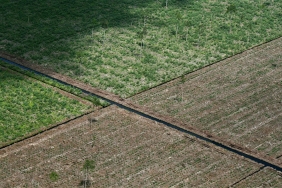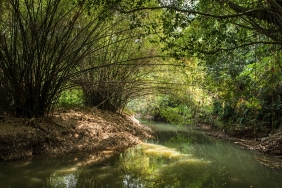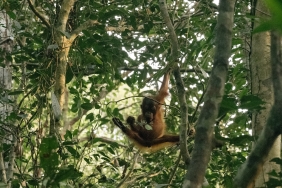CORRUPTION ALSO OCCURS IN THE FOREST
Over the past decade, forestry crime has become organized crime. Perpetrators of smuggling and trafficking of endangered wildlife, as well as smugglers of forest products such as timber, continue to act freely without receiving punishments that have a deterrent effect.
Bribery and corruption are at the root of Indonesia's persistent forestry crime problem. If the authorities are less serious about cracking down on perpetrators of forest destruction who operate in illegal systems or networks, the state will be morally and materially disadvantaged. According to Fathi Hanif, S.H.M.H, Advocacy Manager of WWF Indonesia, forest crimes to date have cost Indonesia billions of rupiah.
Forest Crimes
In committing forestry crimes such as illegal wildlife trade, it is not uncommon for perpetrators to go deep into forest areas, even into the core zone of national parks to take animals from their nests. Often, the hunted animals fall into the category of main predators whose function is to maintain the balance of animal populations in the area. These animals are then smuggled out of the country using forged documents, bribing officials, issuing false documents, falsifying the type of animal being smuggled and mixing illegal species with illegal ones.
In addition to illegal wildlife trade, illegal timber trade is also a scourge that haunts forest sustainability in Indonesia. The inability of authorities to conduct field supervision has resulted in high rates of illegal logging, which not only undermines timber prices, but also destroys ecosystems and biodiversity. Wood species that should be protected are cut down. The logs are then transported by ship with false documents overseas without passing through customs. According to a study by the United Nations Environment Agency (UNEP), losses due to illegal timber in the world are estimated at Rp 300 trillion.
Fighting a Culture of Corruption
Forestry crimes will not increase when the authorized apparatus is not seriously committed to working cleanly, not misusing authority/opportunities/means to enrich themselves. Especially not to accept bribes or cooperate with criminals in ways that are against the law.
According to Hanif, until now, the law enforcement process in court has not been optimal and has not caused a deterrent effect for forest criminals and officials caught committing corruption. Legislation on anti-money laundering that contains provisions related to forestry crimes such as forest products (wood, animals, plants) has not been widely used by law enforcement officials at the first level. Even though the birth of the Anti-Money Laundering Law in Indonesia in 2002 through Law No. 15/2002, which was amended into Law No. 25/2003 on the Crime of Money Laundering (TPPU Law) and which has been replaced into Law No. 8/2010 on the Prevention and Eradication of the Crime of Money Laundering, has given new hope for efforts to create healthy business relationships between banks and the business world in the forestry sector.
With the inclusion of the forestry sector in the Anti-Money Laundering Law in Indonesia as one of the crimes of origin (predicate of crimes), the door is open for forestry crime investigators to request participation/assistance from PPATK to ensnare criminals with the provisions of the Anti-Money Laundering Law.
World Anti-Corruption Day or International Anti-Corruption Day is a good momentum for the community and government to enforce the law in the forestry sector using anti-money laundering legal instruments which are expected to help detect and reveal forest crimes and reduce the traffic/circulation of money from the illegal timber and wildlife trade.
Corruption is not limited to the city center, but also in the villages and the wilderness. We must always be vigilant.





